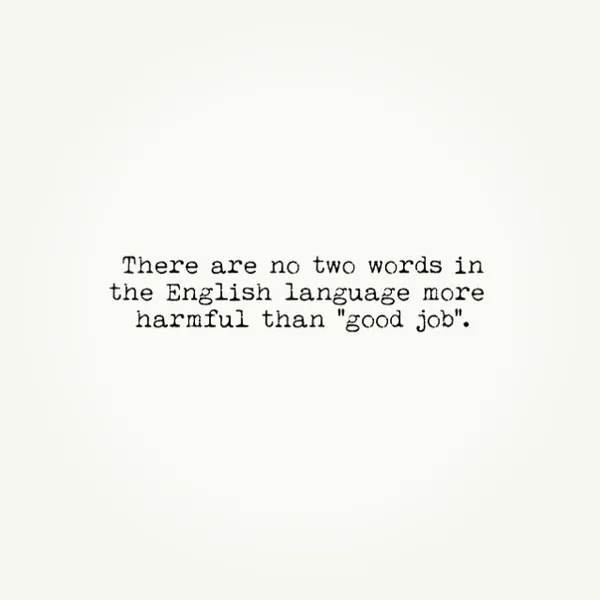
The 2 Most Dangerous Words in the English Language
- Published on
- Muhd Rahiman · 5 min read

If you're among the millions of movie fans around the world who tuned in to the Academy Awards every year and watch Oscar-nominated films, you might be able to recall this famous line from Damien Chazelle's Best Picture-nominated ultra-intense movie, Whiplash. I highly recommend you watch it if you haven't, as the movie poses lots of philosophical questions about to what extent one is willing to achieve their dreams.
When I watched this movie back in 2014, that very line of dialogue (which can be watched here) that was exceptionally delivered by J.K. Simmons (who deservingly won Best Supporting Actor for his amazing portrayal as the cruel and remorseless music conductor who pushed his musicians beyond their breaking points motivated by his obsession to find the best among the rest) stuck with me ever since, and I sometimes thought about it whenever I feel like giving up. The reason why is because (and as much as I hate to admit it):
I think he has a point, and I can see where he's coming from.
What Fletcher is implying in that line is that those words promote mediocrity and the 'good enough' mindset, where one is willing to settle for the bare minimum instead of pushing oneself further to unearthing that inner potential for greatness. Validation, if unregulated, can potentially thwart any extra dedication or effort to do more than what is expected from us to achieve our goal. Sometimes, it can even distort one's motivation into doing things just for the sake of getting these affirmations instead of focusing on a bigger objective.
Of course, I disagree that one has to opt for unconventional, unorthodox and downright abusive, demeaning and insulting means to achieve greatness, such as what Fletcher has inflicted upon Neiman, played by Miles Teller. Violence is never an answer to anything, and creating a hostile environment is never the way to motivate people to strive for excellence. But while I wouldn't take it to the extreme as Fletcher, I agree with his overall point.
When I recalled my past life experiences, many of the instances that propelled my growth comes from the near-insatiable desire for perfection–even if it's unattainable. Criticisms and negative feedback given by those who mentored me (or even from myself) pushed my limit beyond what I initially thought I was capable of, far more than the compliments I've gotten along the way. After all, diamonds can only form under immense pressure.
Was it tough? Of course. Did I like the experience? Absolutely not. But what's good for you isn't always something that you like doing, so we have to keep reminding ourselves of that.
In our culture, we often dread or sulk at the sight of getting our work scrutinised. We only yearn to get our work accepted on the first try and complimented at the highest levels. Unfortunately, life doesn't always work that way. If anything, one should be grateful that someone especially of skill and reputation is willing to take the time and effort to analyse your work and come up with constructive criticisms. It shows that they believe you're going to be worth their investment and that they believe in your potential to go further.
In more blatant terms, when someone gives enough of a shit about you and wants to improve, they won't sugarcoat and just call a spade, a spade. It's miles better and preferable compared to if you obtained generic remarks which are nowhere near as helpful.
For instance, I much rather that my FYP panels give long, detailed comments focusing on what's lacking about my project instead of what I did well, rather than vague and general positive ones that I can't use as a reference for improvements.
At the end of the day, it's all about mindset and changing your perspective on how you see and interpret negative feedback.
To me. the best recipe for shaping others for success would be to give positive reinforcement on top of providing useful pointers for improvement. Giving mere compliments like 'good job' won't help anyone improve at all, because frankly anyone can say that. Granting oneself the illusion of satisfaction with major compliments can kill one's drive. Sure, let them know when they're heading in the right direction, but too much of it is poisonous. The desirable outcome is that we want people to think more critically of themselves and in turn just gradually work towards improving their craft rather than overwork themselves.
At the end of the day, we all have to ask ourselves: How far are we willing to go and push ourselves until it no longer seems to be worth doing that? What will be the answer to that question will determine your tolerance level.
So, while 'good job' aren't __ the most dangerous word in the English corpora, it sure can have a lasting impact if not used sparingly. The words you use, and anything that accompanies those words in the form of an award, should be aligned with the level of the result achieved by the person you’re recognising.